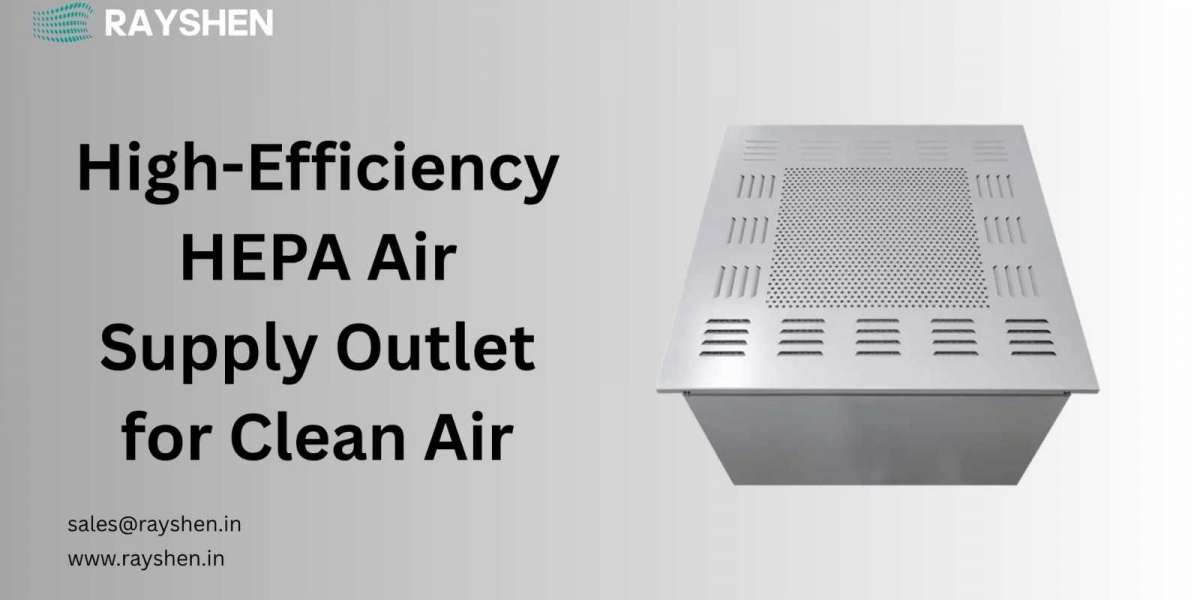In modern industries and everyday life, air quality has become a critical concern. From clean rooms and hospitals to homes and offices, ensuring that the air we breathe is free from harmful particles is essential. This is where HEPA (High Efficiency Particulate Air) filters come in. Known for their unmatched efficiency, HEPA filters are widely used in environments that demand the highest level of cleanliness and safety.
Rayshen, a trusted provider of advanced clean room and air filtration solutions, offers high-quality HEPA systems that help industries maintain contamination-free environments. But what exactly is a HEPA filter, and how does it work? Let’s explore.
What is a HEPA Filter?
A HEPA filter is a specially designed air filter capable of trapping 99.97% of particles as small as 0.3 microns in diameter. To put that into perspective, a human hair is about 70 microns wide—more than 200 times larger than the smallest particle a HEPA filter can capture.
The term “HEPA” is not just a marketing label. It’s a standardized designation that meets strict international performance criteria. For a filter to qualify as HEPA, it must meet rigorous testing standards, ensuring high efficiency in removing dust, pollen, mold, bacteria, and even microscopic airborne contaminants.
Why HEPA Filters Are Important
Clean air is more than just comfort—it’s a necessity in industries where contamination can cause product failure, health risks, or safety issues.
- In healthcare, HEPA filters prevent the spread of infectious particles.
- In laboratories, they ensure sterile environments for experiments and research.
- In semiconductor and electronics industries, they protect sensitive equipment and microchips from dust and particles.
- In clean rooms, HEPA filters are indispensable for maintaining ISO-certified contamination control.
By integrating HEPA solutions from Rayshen, facilities achieve not only compliance but also confidence in their air quality.
How Does a HEPA Filter Work?
The magic of a HEPA filter lies in its structure and filtration mechanisms. Unlike ordinary filters that act like simple sieves, HEPA filters use a combination of scientific principles to capture particles of different sizes.
1. The Structure of a HEPA Filter
A HEPA filter is made up of a dense mat of fine, randomly arranged fibers—usually composed of fiberglass. The thickness and intricate weave of the fibers create a powerful filtration medium capable of capturing both large and microscopic particles.
2. Mechanisms of Particle Capture
HEPA filters trap particles through four key mechanisms:
- Inertial Impaction: Larger particles (like dust or pollen) can’t follow the airstream’s sudden changes and crash into the filter fibers, sticking to them.
- Interception: Medium-sized particles follow the airflow but get too close to a fiber and are intercepted.
- Diffusion: Ultrafine particles (smaller than 0.1 microns) move irregularly (Brownian motion) and are captured by fibers.
- Sieving: When particles are larger than the gaps between fibers, they are directly blocked.
Together, these processes make HEPA filters highly effective across a wide range of particle sizes, including those most harmful to human health.
Applications of HEPA Filters
HEPA filters are versatile and used across industries, healthcare, and even daily life.
1. Clean Rooms
In clean rooms, where even a single particle can compromise research or production, HEPA filters maintain air purity. They ensure compliance with ISO clean room standards, essential for pharmaceuticals, semiconductors, and biotechnology.
2. Healthcare and Hospitals
HEPA filtration prevents airborne pathogens from spreading in sensitive areas like operating rooms, isolation wards, and ICUs. This significantly reduces the risk of hospital-acquired infections.
3. Electronics and Semiconductor Industry
When manufacturing microchips, wafers, and other delicate components, a single dust particle can cause costly defects. HEPA filters ensure contamination-free environments for high-precision processes.
4. HVAC Systems and Air Purifiers
HEPA filters are also used in HVAC systems and portable air purifiers for homes, offices, and commercial buildings, improving indoor air quality for everyday health.
Rayshen HEPA Solutions
At Rayshen, we understand that industries demand not only efficiency but also reliability. Our HEPA housing modules are engineered to provide exceptional air filtration for critical applications.
Key Features of Rayshen HEPA Systems:
- High Efficiency: Designed to capture the smallest airborne particles, ensuring safe and sterile environments.
- Durable Construction: Made with robust materials for long-lasting performance.
- Customizable Design: Available in different sizes and configurations to meet the unique needs of clean rooms, labs, and industrial facilities.
- Easy Integration: Rayshen HEPA modules are engineered for seamless installation in existing HVAC or clean room systems.
By choosing Rayshen HEPA solutions, businesses gain confidence in meeting global standards for cleanliness and air quality.
How to Maintain a HEPA Filter
Even the best HEPA filters require regular maintenance to remain effective. Proper care not only extends their lifespan but also ensures continued performance.
- Scheduled Replacement: HEPA filters should be replaced as per the manufacturer’s guidelines, usually every 6 to 12 months depending on usage.
- Regular Inspections: Visual checks for dust accumulation or airflow blockages help identify issues early.
- Air Quality Monitoring: Continuous monitoring ensures the HEPA filter is performing to specification.
- Professional Servicing: Especially in critical facilities, rely on trained professionals for cleaning and replacement.
Rayshen provides support and guidance for maintaining HEPA modules, ensuring that your systems always operate at peak efficiency.
The Advantages of HEPA Over Other Filters
Not all filters are created equal. Standard filters may capture large dust particles, but they cannot trap microscopic contaminants.
- HEPA filters can capture particles as small as 0.3 microns with near-perfect efficiency.
- Other filters often fail to meet such high standards, leaving harmful contaminants in the air.
This makes HEPA the filter of choice in environments where air quality is critical.
The Future of HEPA Technology
As industries evolve, the role of HEPA filters will continue to expand. With advancements in nanotechnology, AI, and biotechnology, cleaner environments will be more important than ever. HEPA technology is also being integrated into next-generation HVAC systems and even smart homes, making safe air accessible to all.
Companies like Rayshen are at the forefront of this innovation, developing solutions that not only meet today’s demands but also anticipate future needs.
Conclusion
A HEPA filter is far more than a piece of equipment—it’s a guardian of health, safety, and product quality. By using advanced filtration mechanisms, HEPA ensures that the air we breathe and the environments we work in are free from harmful contaminants.
From clean rooms and laboratories to hospitals and semiconductor plants, HEPA plays a vital role in ensuring precision, safety, and compliance. With Rayshen’s HEPA solutions, industries gain reliable, efficient, and future-ready filtration systems that truly engineer confidence, not just equipment.
If you’re looking to safeguard your operations and maintain world-class standards, investing in a HEPA solution from Rayshen is the smartest choice.








